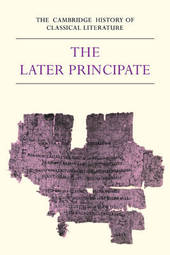
|
The Cambridge History of Classical Literature: Volume 2, Latin Literature, Part 5, The Later Principate
Paperback / softback
Main Details
| Title |
The Cambridge History of Classical Literature: Volume 2, Latin Literature, Part 5, The Later Principate
|
| Authors and Contributors |
Edited by E. J. Kenney
|
|
Edited by W. V. Clausen
|
| Series | The Cambridge History of Classical Literature |
|---|
| Physical Properties |
| Format:Paperback / softback | | Pages:164 | | Dimensions(mm): Height 229,Width 152 |
|
| Category/Genre | Literary studies - classical, early and medieval |
|---|
| ISBN/Barcode |
9780521273718
|
| Classifications | Dewey:880.09 |
|---|
| Audience | | Professional & Vocational | | Tertiary Education (US: College) | |
|---|
| Illustrations |
Worked examples or Exercises
|
|
Publishing Details |
| Publisher |
Cambridge University Press
|
| Imprint |
Cambridge University Press
|
| Publication Date |
14 July 1983 |
| Publication Country |
United Kingdom
|
Description
In the two centuries covered by this volume, from about AD 250 to 450, the Roman Empire suffered a period of chaos followed by drastic administrative and military reorganization. Simultaneously Christianity emerged as a new religious force, to be first recognized by Constantine and then eventually to become the official religion of the Roman state. The old pagan culture continued to provide the basis for education and the staple literary diet of the leisured classes; but it now had perforce to coexist and indeed to compete with a new, specifically Christian-oriented literature. These and associated developments are reflected in the Latin books of the period. Of the traditional forms and genres, some atrophied, some were transformed and invigorated; and yet others, such as autobiography in something like the modern sense, emerged in response to the pressures of the times. Professor Browning's masterly and comprehensive survey is mostly concerned with pagan literature, but takes into account Christian texts written in classical forms and directed at classically educated readers. The volume ends with a chapter on Apuleius by Professor Walsh, followed by a brief Epilogue from the same hand, sketching the part played by classical studies in the formation of the Latin literature of the Middle Ages.
|